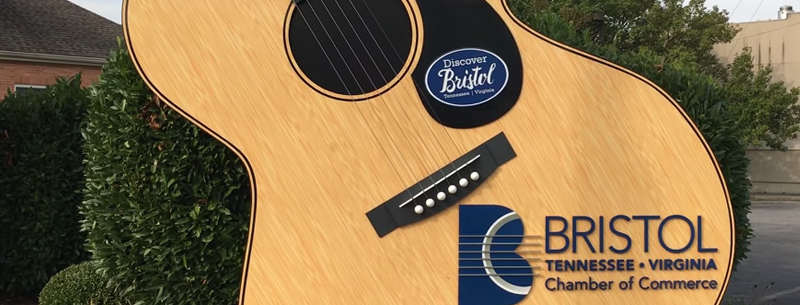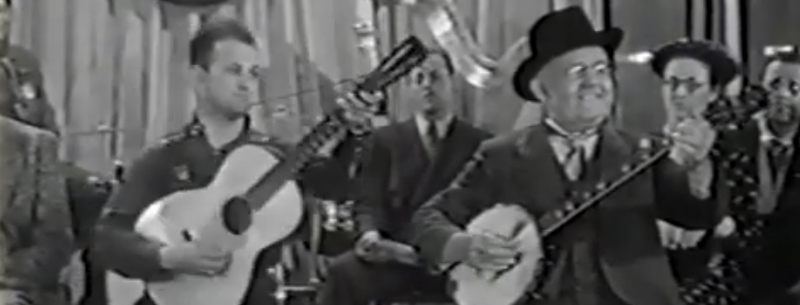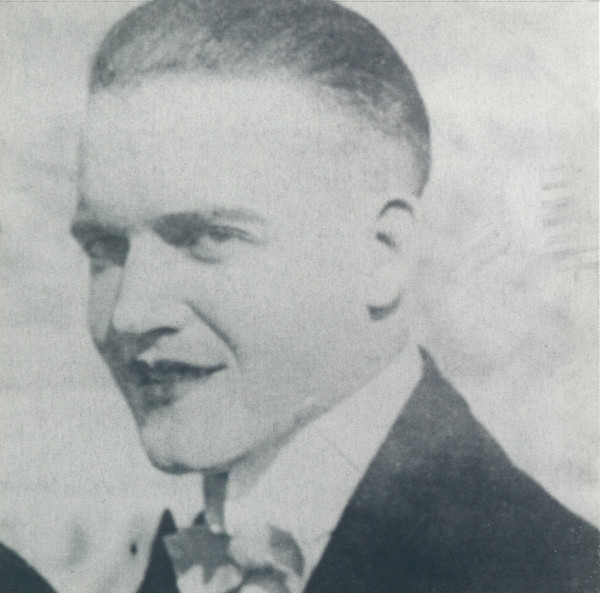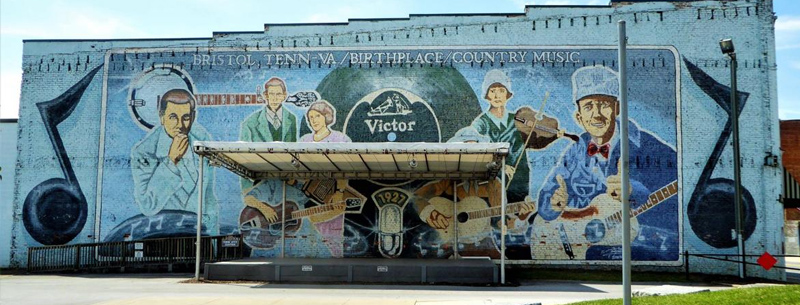Birth of Country Music
The mention of Appalachia conjures banjos in most folks’ minds – perhaps not always with the most positive connotation, due to a certain film from the 1970s with a theme (“Dueling/Feudin’ Banjos“) authored by North Carolina’s own Arthur Smith. Country music and its sub-genres of old-time and bluegrass music are as much a part of mountain life as walking uphill.
Birthplace of Country Music
Bristol, Tennessee is known as the “Birthplace of Country Music” due to a recording session that took place there in 1927. Guided by Ernest Stoneman, Ralph Peer set up there to record the “hillbilly music” that was beginning to show signs of popularity among the music-buying public. Among the musicians he recorded were Stoneman (from Galax, VA), the Carter Family (from Hiltons, Va), and Jimmy Rodgers (the tubercular Mississippi native known as the father of country music, who was residing in Asheville, NC at the time). The success of these records, in large part, created the country music industry.

Origins of Country
This leads us to the question of what is country music? The roots of country music certainly existed before the Bristol sessions. Immigrants to America, especially from the British Isles, brought with them the fiddle tunes and folk ballads of their homelands. These were the roots of the old-time music and the dark, tragic songs that made mountain music famous. Although this music was popular before and during the Civil War, fiddle contests and conventions in the early 1900s were so important to the southern culture that they made men such as Fiddlin’ John Carson and Uncle Jimmy Thompson famous. Old-time performers, such as Uncle Dave Macon, Gid Tanner, and Charlie Poole continued this tradition, bringing in the banjo, guitar, and other instruments to fill out the sound.

The difference between old-time and country music is the influence of other genres of music on the Anglo-Celtic traditions – the melting pot. Early on, the German and Czech influence could be heard in tunes such as “Under the Double Eagle“. The south has never been as racially segregated as our northern neighbors would like to imagine and influences of blues, jazz, and popular music like show tunes were being played by rural southern musicians as far back as American music is documented.
The Bristol Sessions
What made the Bristol Sessions the “birth” of country music, as opposed to old-time or mountain music is the influence of blues, jazz, etc. While the Carter Family’s music is influenced by the same blues that would later lead Bill Monroe to create the dynamic form of music known as bluegrass, Jimmy Rodgers’ music is full of blues and jazz influences. Indeed, on several of his later recording, he was backed by a dixie-land jazz band that included Louis Armstrong’s mentor, King Oliver.
Father of Country Music
So, the Bristol Sessions were where country music was “born” and Jimmy Rodgers was the father (and I guess the Carters were the family and Pop Stoneman was the grandfather), but was Jimmy Rodgers the first? Did he come out of nowhere?
The answer is no. Jimmy Rodgers had a mentor, a musical hero who did not come from the Appalachians at all. He did, however, work frequently in Asheville, where he is believed to have crossed paths with (perhaps even worked with) Rodgers. His name was Emmett Miller (1900-1962).

Most folks have never heard of Emmett Miller, which is one of the great tragedies of American Music history. Miller was, most likely, purposely forgotten because he performed in blackface. Today, blackface performance is scorned, but in Miller’s era, it was considered a legitimate art form. He performed country music, blues, and jazz to white audiences as he traveled throughout the south in medicine shows. Perhaps his true legacy was in introducing the music of black musicians to white audiences in the only format acceptable at the time. Regardless, he was one of the most influential singers and musicians of his time and he was also a truly funny comic. At times, his comic partner was an actual black man, Scatman Cruthers – legendary singer, musician, and comedian.
Emmett Miller’s Songs
You know Emmett Miller’s songs: “Lovesick Blues” (made famous by Hank Williams who sang it note for note in Miller’s style), “Right or Wrong” (a big hit for Bob Wills and recently George Straight), “Anytime” (one of Eddy Arnold’s biggest hits) and “I Ain’t Got Nobody” (performed by musicians as diverse as Fats Waller, Bob Wills, Bing Crosby, Louie Prima, David Lee Roth, and Lou Bega). His version of WC Handy’s “Saint Louis Blues” became the standard that many would emulate.
https://www.youtube.com/watch?v=-Xu71i89xvs
The fact that you have never heard of him becomes more remarkable when you consider that this incredible singer was backed by a band that included (the father of jazz guitar) Eddie Lang, Tommy Dorsey, Jimmy Dorsey, and Gene Krupa!
Final Word
This man from Macon Georgia, backed by one of the hottest jazz bands of his time (called the Georgia Crackers), performed songs that would inspire countless country bands for generations to come. This was southern music, American music… country music. Miller’s melding of cultures and genres sowed the seeds of rockabilly and rock n roll (Elvis wasn’t the first “white singer who sounded black” as Sam Phillips labeled him). The Appalachian Visitor Center salutes the true great-grandfather of country music, Emmett Miller.
